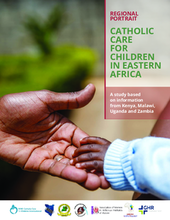This regional portrait describes Catholic-sponsored care for children in Eastern Africa using data from Kenya, Malawi, Uganda and Zambia. The first large study of its kind, it focuses on children who are particularly vulnerable—those at risk of or those who have been separated from their families. Many are in institutional care.
This portrait also describes growing efforts, led by women and men religious, to ensure children can grow up in safe, nurturing families or family-like environments rather than institutions. Through national associations of religious, Catholic Care for Children programmes are part of and contributing to a much wider global trend in care reform seeking to reduce recourse to institutional care in favour of family- and community-based care for children.
This regional portrait has been a collaborative effort.
- Catholic Care for Children International (CCCI) is a project of the International Union of Superiors General (Rome) that supports Catholic Care for Children—a sister-led, charism-driven movement to ensure children grow up in safe, nurturing families.
- Four national associations of religious in Eastern Africa sponsor Catholic Care for Children (CCC) programmes: the Association of Sisterhoods of Kenya (AOSK), the Association of Women Religious in Malawi (AWRIM), the Association of Religious in Uganda (ARU) and the Zambia Association of Sisterhoods (ZAS). Working with Catholic-sponsored childcare institutions and programmes throughout their respective countries, they are advancing care reform by helping religious institutes read the signs of the times and find new ways to express a charism of care for children in the 21st century. CCCK, CCCM, CCCU and CCCZ teams provided most ofthe data for this regional portrait.

